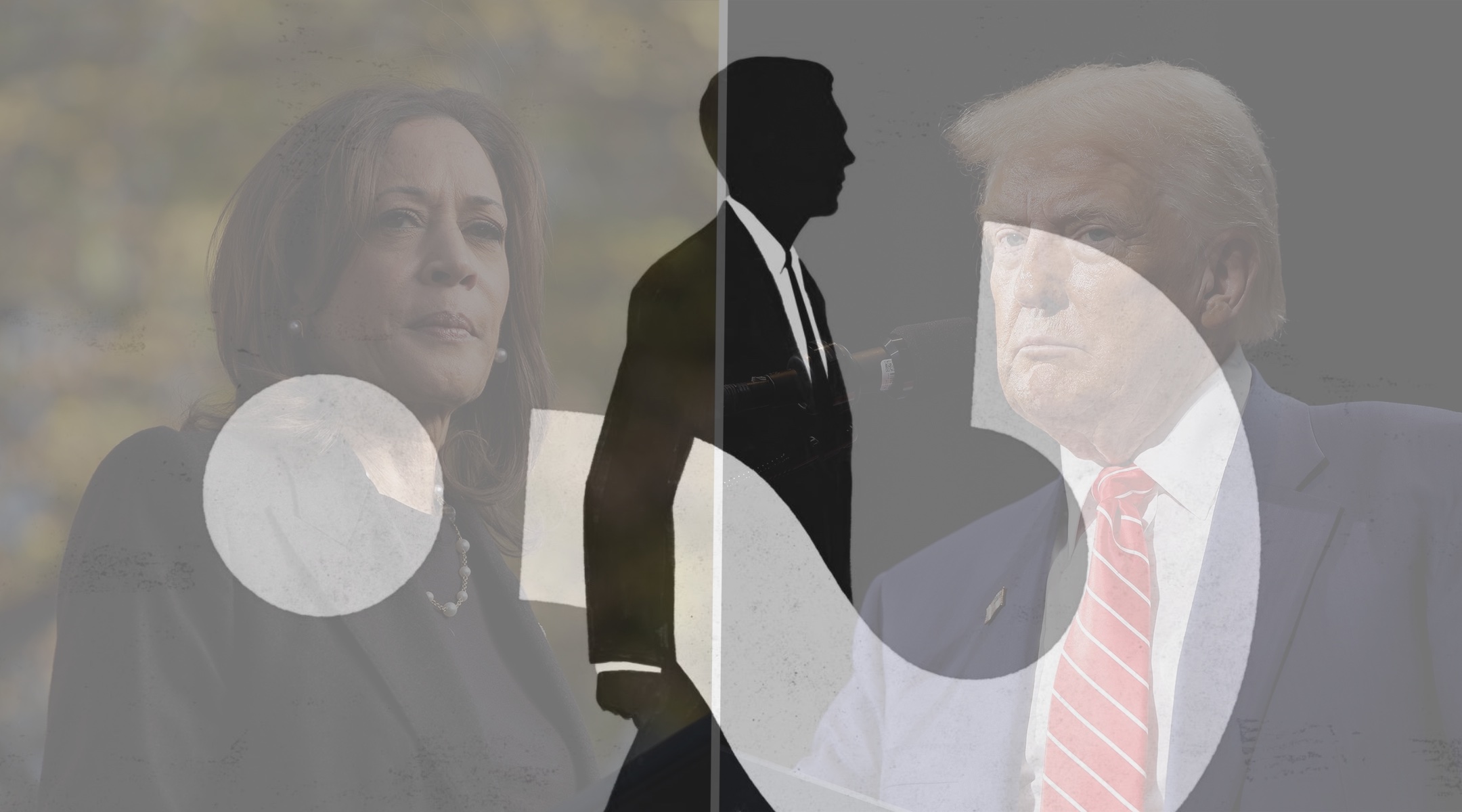This election, I finally understand the undecided Jewish voter
Oct. 7 and its aftermath scrambled the political certainties of many pro-Israel voters, writes a longtime Jewish journalist

(Getty Images; JTA illustration)
(JTA) — “I don’t know anyone voting for Trump,” my mother said, hyperbolically. She hates the man so virulently that my sister and I are sure to steer clear of talking politics, even though we are all Democrats.
 My mother is wrong. My father, her ex-husband, is a staunch Trump supporter, and likely switched his party affiliation the minute he divorced her 30 years ago. But so is my brother, an ultra-Orthodox rabbi in Los Angeles, whose congregation is likely to vote in large numbers for the former president as well.
My mother is wrong. My father, her ex-husband, is a staunch Trump supporter, and likely switched his party affiliation the minute he divorced her 30 years ago. But so is my brother, an ultra-Orthodox rabbi in Los Angeles, whose congregation is likely to vote in large numbers for the former president as well.
Mine is a family divided, an instantiation of the polarization that has swept the country. Meanwhile, the polls show that a sizeable majority of Jews will once again vote for the Democratic candidate.
But neither the polls nor my relatives’ politics tell the whole Jewish story in this tense election year. I suspect that no matter how Jews end up voting, many are going to the polls this year as part of the small but significant cohort of undecided voters.
I used to be incredulous about the undecided voter. “How can anyone not know who they want to vote for?” I’d demand. “It’s always so clear!” As a lifelong Democrat who supports women’s rights, gay marriage, welcoming immigrants and a whole slew of other liberal positions, I thought something must be wrong with undecided voters.
The came Oct. 7, and the silence of our liberal friends, colleagues, companies, compadres.
Yes, we’d stood up with them for #MeToo, #BlackLivesMatter and every liberal cause, but they were not standing up for us. Even before Israel launched a ground invasion of Gaza – well before it launched an invasion of Lebanon — progressives began denouncing Israel, accusing it of genocide, ignoring the hostages and either ignoring or defending the killing by Hamas of 1,200 people in Israel on what some called a day of “liberation.”
As the months went by, and the death toll rose — and hostages (or their bodies) remained in Gaza — it got worse here in America: College campuses became protest zones that made many Jews feel unsafe; “Zionist” authors were blacklisted; artists came out against Israel and lifelong Democrats like me began to feel adrift: betrayed, abandoned, alone.
It was through this lens that Jews like me began to look at our political choices. Yes, President Biden rushed to back Israel after Oct. 7, and gave it a green light to root out Hamas. Harris came out at the Democratic National Convention for “Israel’s right to defend itself,” but will she do the same if elected president? Could the Democrats have done more to denounce what was happening on the campuses?
And yes, while Trump has said many problematic things about Jews and other minorities – including suggesting Jews will bear a big part of the blame should he lose — his record on Israel and Iran was reliably hawkish. Meanwhile, it was Republicans such as Ron DeSantis in Florida and Elise Stefanik in upstate New York who came down the hardest on the campus protests.
As I consider this tension, on the eve of a momentous election, I finally, deeply understand the undecideds.
I’m not the first to observe that what we have long referred to as voters who are undecided are actually voters who are unexcited. It’s not that most of these people don’t understand the issues, or haven’t researched the candidates. It’s that they once they begin to question which issues are most important to them, no candidate stacks up. If Kamala Harris and the Democratic Party are bad for Israel, but Donald Trump and the Republicans are bad for America, who do you vote for?
Historically, “dual loyalty” is a “bigoted trope used to cast the Jews as the other,” according to the American Jewish Committee. But alive and kicking around the heart and soul of many Jews in America is a question that many of them dare not say aloud: Which is more important to us at this fraught moment, Israel or America?
“America will be around forever but Israel’s very existence is at stake,” one undecided voter commented on my Facebook page.
My Israeli-born, naturalized American husband, meanwhile, pointed out that the equation is not so simple: He doesn’t believe that Trump is good for Israel — just good for Israeli Prime Minister Benjamin Netanyahu.
“Which president is better for Israel,” he said, “depends on which Israel you support — Bibi’s nationalist-fundamentalist one, or the progressive, secular state” (which he sees himself part of).
And for many Jewish voters, it’s actually not clear what “good for Israel” might even mean anymore. Does it mean letting Netanyahu and his government do whatever they want, unfettered? Or does it mean restraining the worst impulses of a right-wing government and pushing Israel’s leaders to keep hopes for a two-state solution alive?
I recently took three hours of my day to listen to Bari Weiss’ Honestly Podcast, featuring a debate between conservative Ben Shapiro and liberal Sam Harris. Shapiro was unabashedly team Trump, and Sam Harris a more tepid supporter for Kamala Harris (or “anyone but Trump”). They each thought their candidate was better for both Israel and America, resolving the dual loyalty question.
Come Election Day, many people won’t vote, will write in other candidates or will vote holding their noses. And I bet there are other “dual loyalists” trying to choose between their pocketbooks and conscience — or other competing loyalties.
And I? I would lose friends on both sides for saying who I am voting for — either getting called a self-hating Jew or a Nazi. (The irony is not lost on me.)
But my point is not who I’m voting for. It’s that I finally understand the undecideds. And I’m throwing my hat in with them.
The views and opinions expressed in this article are those of the author and do not necessarily reflect the views of JTA or its parent company, 70 Faces Media.















